Takbeer of Eid In English, Transliteration And Arabic Text
Advertisements
Takbeer of Eid is one of the greatest Sunnahs on the day of Eid. The issue of Eid takbeer is broad in scope because the command is to say takbir in general.
There are different forms of takbir since the Messenger (peace and blessings be upon him) did not single out any particular format of takbirat. Continue reading to learn the different forms of Eid takbeer.
What Is Takbeer Of Eid?
Takbir of Eid is saying takbir in the days of dhul-Hijjah which is permissible from the beginning of Dhul-Hijjah until the end of the 13th day. This takbeer is Sunnah according to the majority of scholars.
It is Sunnah for both men and woman, in the mosque, in the home and in the marketplace. Men should say it out loud, and women should say it quietly, because women are commanded to lower their voices.
Eid Takbeer When To Start
The time for takbeer on Eid al-Fitr starts from the night before Eid until the imam enters to lead the Eid prayer. In the case of Eid al-Adha, the takbeer begins on the first day of Dhu’l-Hijjah and lasts until sunset on the last of the days of tashreeq.
Advertisements
The issue of ‘Eid takbir is broad in scope because the command is to say takbir in general, and the Messenger (peace and blessings be upon him) did not single out any particular format of takbirat.
Eid Takbeer Arabic Text
Here is the full Eid takbir in Arabic text
اللَّهُ أَكْبَرُ اللَّهُ أَكْبَرُ لَا إلَهَ إلَّا اللَّهُ. وَاَللَّهُ أَكْبَرُ اللَّهُ أَكْبَرُ وَلِلَّهِ الْحَمْدُ
Eid Takbeer Transliteration
The transliterated wording of Eid takbir is:
Allahu Akbar, Allahu Akbar, La Ilaha Illa Allah; Allahu Akbar, Allahu Akbar, walillah Al Hamd.
Advertisements
Eid Takbeer in English
The Takbir of Eid in English is Allah is the Greatest, Allah is the Greatest. There is no god but Allah; Allah is the Greatest, Allah is the Greatest, and all praise is due to Allah).
This is proven from Ibn Mas‘ud (may Allah be pleased with him) and others of the early generation.
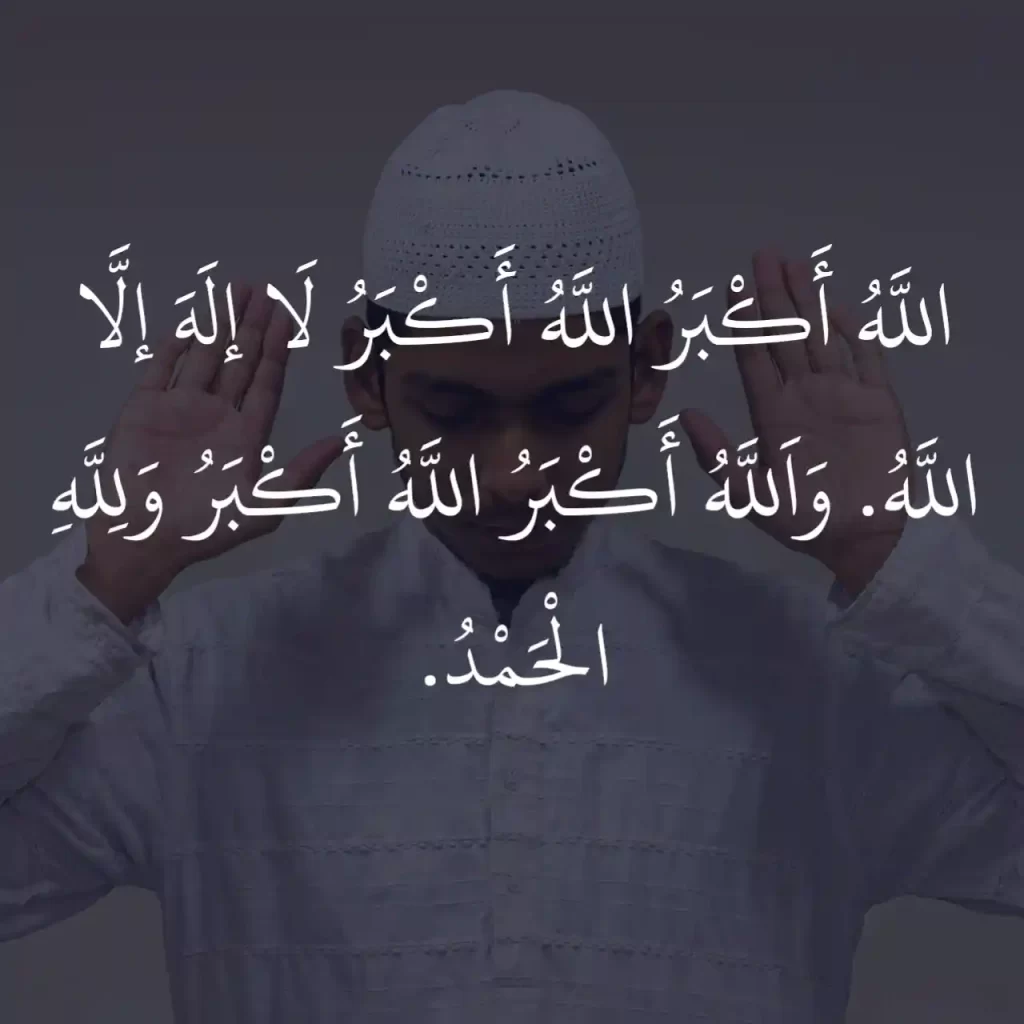
Another formula of Eid Takbir is Allahu akbaru kabira wa alhamdu Lillahi kathira wa subhan Allahi bukratan wa asila.
Meaning There is no god but Allah, Allah is most Great, Allah is most Great, much praise be to Allah and glory be to Allah at the beginning and end of the day…).
| Arabic Text | English Meaning |
| اللَّهُ أَكْبَرُ | Allah is the Greatest |
| اللَّهُ أَكْبَرُ | Allah is the Greatest |
| لَا إلَهَ إلَّا اللَّهُ | There is no god but Allah |
| وَاَللَّهُ أَكْبَرُ | Allah is the Greatest |
| اللَّهُ أَكْبَرُ | Allah is the Greatest |
| وَلِلَّهِ الْحَمْدُ | And all praise is due to Allah |
Eid Takbir Audio
Here is the MP3 of this beautiful takbirat for correct pronunciation.
The matter is broad in scope, because the command is to say takbir in general, and the Messenger (blessings and peace of Allah be upon him) did not single out any particular format of takbirat.
Allah, may He be exalted, says (interpretation of the meaning):
“and that you must magnify Allâh [i.e. to say Takbîr (Allâhu-Akbar; Allâh is the Most Great) for having guided you.”
Surah al-Baqarah ayat 185
So one may follow the Sunnah by saying any format.
Read the meaning of takbir.
Importance Of Eid Takbir
Takbir is one of the most prominent Islamic rites. It is reported that the Prophet (peace and blessings be upon him) said:
“Ornament your feasts with takbir.”
Therefore, Muslims should observe takbir on the day of Eid. On their way to performEid Prayer and as they wait for it, Muslims should make takbir loudly, saying:
“Allahu Akbar, Allahu Akbar, La Ilaha Illa Allah; Allahu Akbar, Walillah Al Hamd” This is the version adhered to by Ibn Mas`ud as well as Imam Ahmad.
It is one of the greatest Sunnahs on the day of Eid because Allaah says (interpretation of the meaning):
“(He wants that you) must complete the same number (of days), and that you must magnify Allaah [i.e. to say Takbeer (Allaahu Akbar: Allaah is the Most Great)] for having guided you so that you may be grateful to Him”
Surah al-Baqarah:185
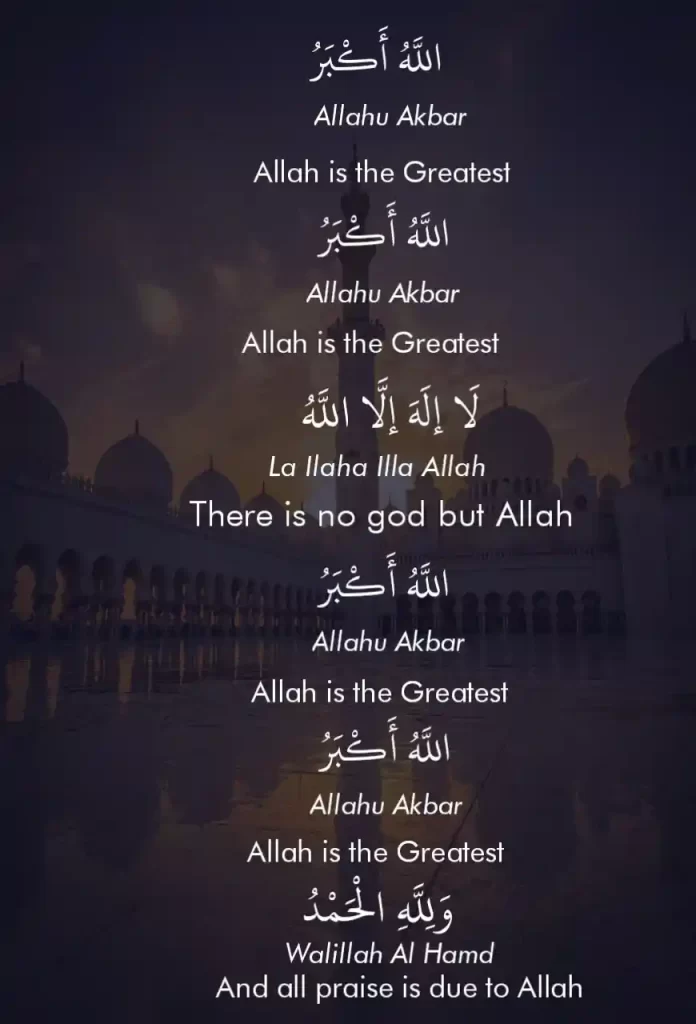
It was narrated that al-Waleed ibn Muslim said: I asked al-Awzaa’i and Maalik ibn Anas about saying Takbeer out loud on the two Eids. They said, Yes, ‘Abd-Allaah ibn ‘Umar used to say it out loud on the day of al-Fitr until the imam came out (to lead the prayers).
It was narrated in a saheeh report that ‘Abd al-Rahmaan al-Sulami said, “They emphasized it more on the day of al-Fitr than the day of al-Adha.” Wakee’ said, this refers to the takbeer.
Al-Daaraqutni and others narrated that on the morning of Eid al-Fitr and Eid al-Adha, Ibn ‘Umar would strive hard in reciting takbeer until he came to the prayer place, then he would recite takbeer until the imam came out.
Ibn Abi Shaybah narrated with a saheeh isnaad that al-Zuhri said: The people used to recite Takbeer on Eid when they came out of their houses until they came to the prayer place, and until the imam came out. When the imam came out they fell silent, and when he said takbeer they said takbeer. See Irwa’ al-Ghaleel, 1/121
Saying takbeer when coming out of one’s house to the prayer place and until the imam came out was something that was well known among the salaf (early generations).
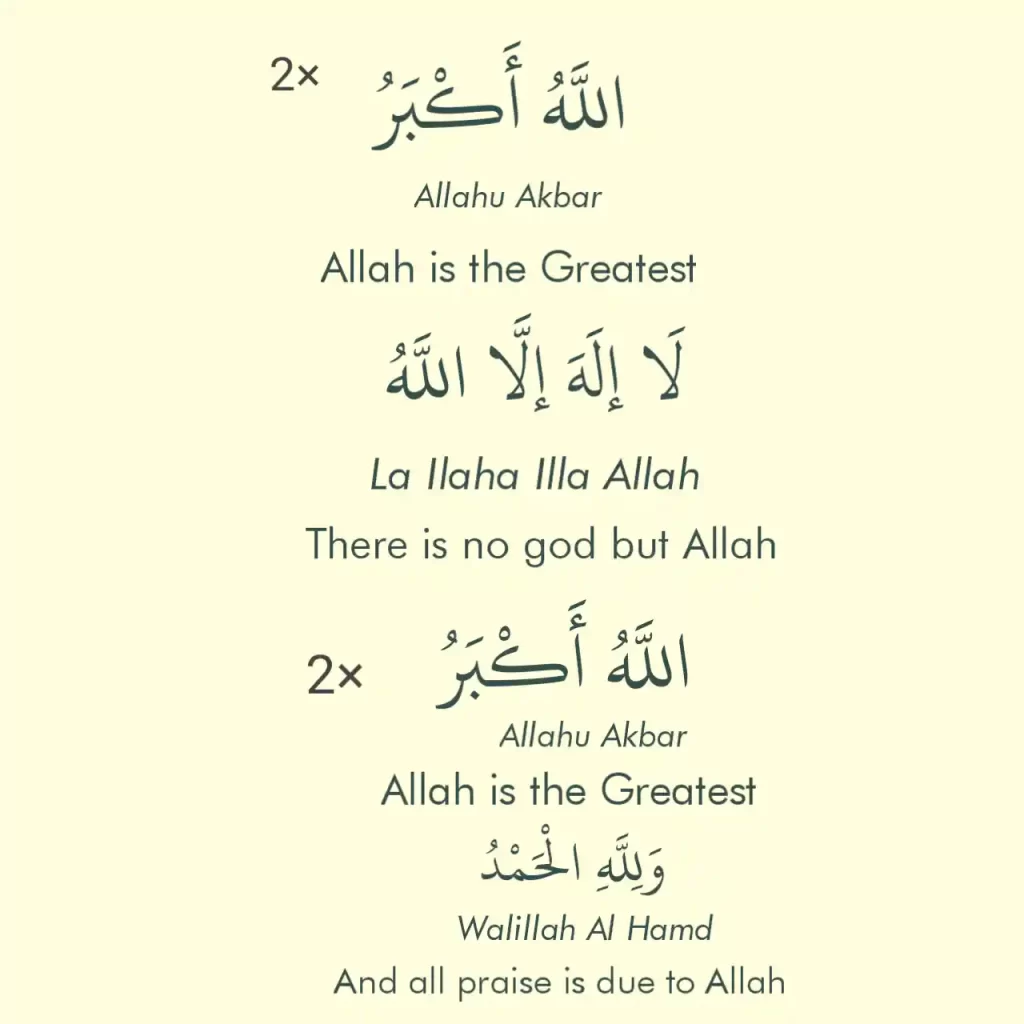
This has been narrated by a number of scholars such as Ibn Abi Shaybah, ‘Abd a l-Razzaaq and al-Firyaabi in Ahkaam al-Eidayn from a group of the salaf. For example, Naafi’ ibn Jubayr used to recite takbeer and was astonished that the people did not do so, and he said, “Why do you not recite takbeer?”
Ibn Shihaab al-Zuhri (may Allaah have mercy on him) used to say, “The people used to recite takbeer from the time they came out of their houses until the imam came in.”
It was narrated in the Musannaf of Ibn Abi Shaybah with a saheeh isnaad from Ibn Mas’ood (may Allaah be pleased with him) that he used to recite takbeer during the days of tashreeq:
Allaahu akbar, Allaahu akbar, laa ilaaha ill-Allaah, wa Allaahu akbar, Allaah akbar, wa Lillaah il-hamd (Allaah is Most Great, Allaah is most Great, there is no god but Allaah, Allaah is Most great, Allaah is most great, and to Allaah be praise).
It was also narrated elsewhere by Ibn Abi Shaybah with the same isnaad, but with the phrase “Allaahu akbar” repeated three times.
Advertisements



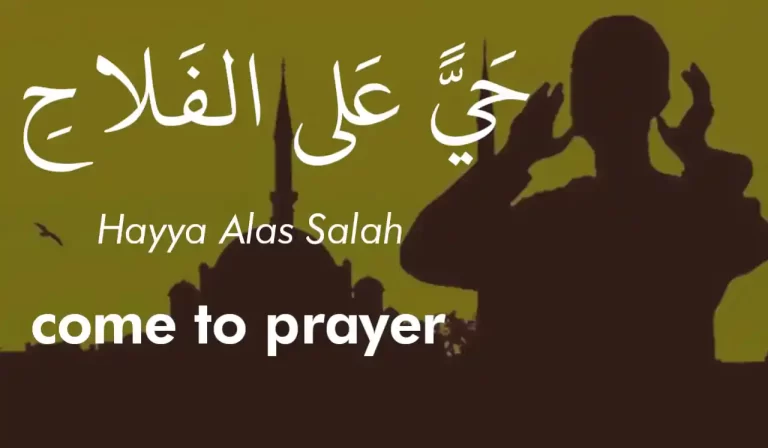

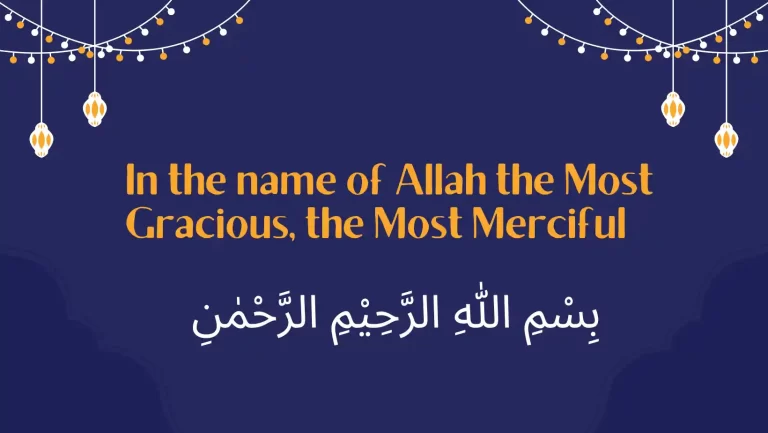

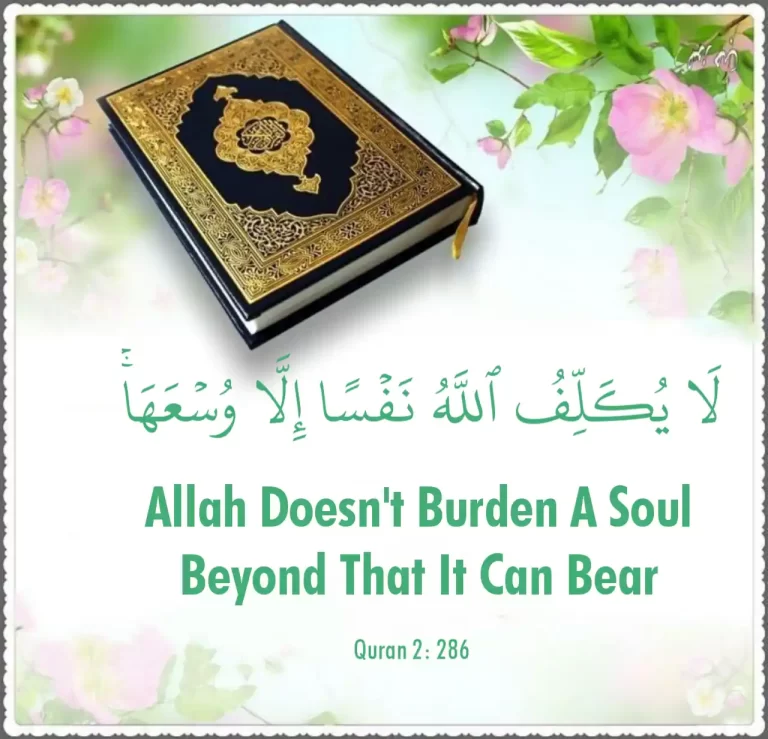
2 Comments